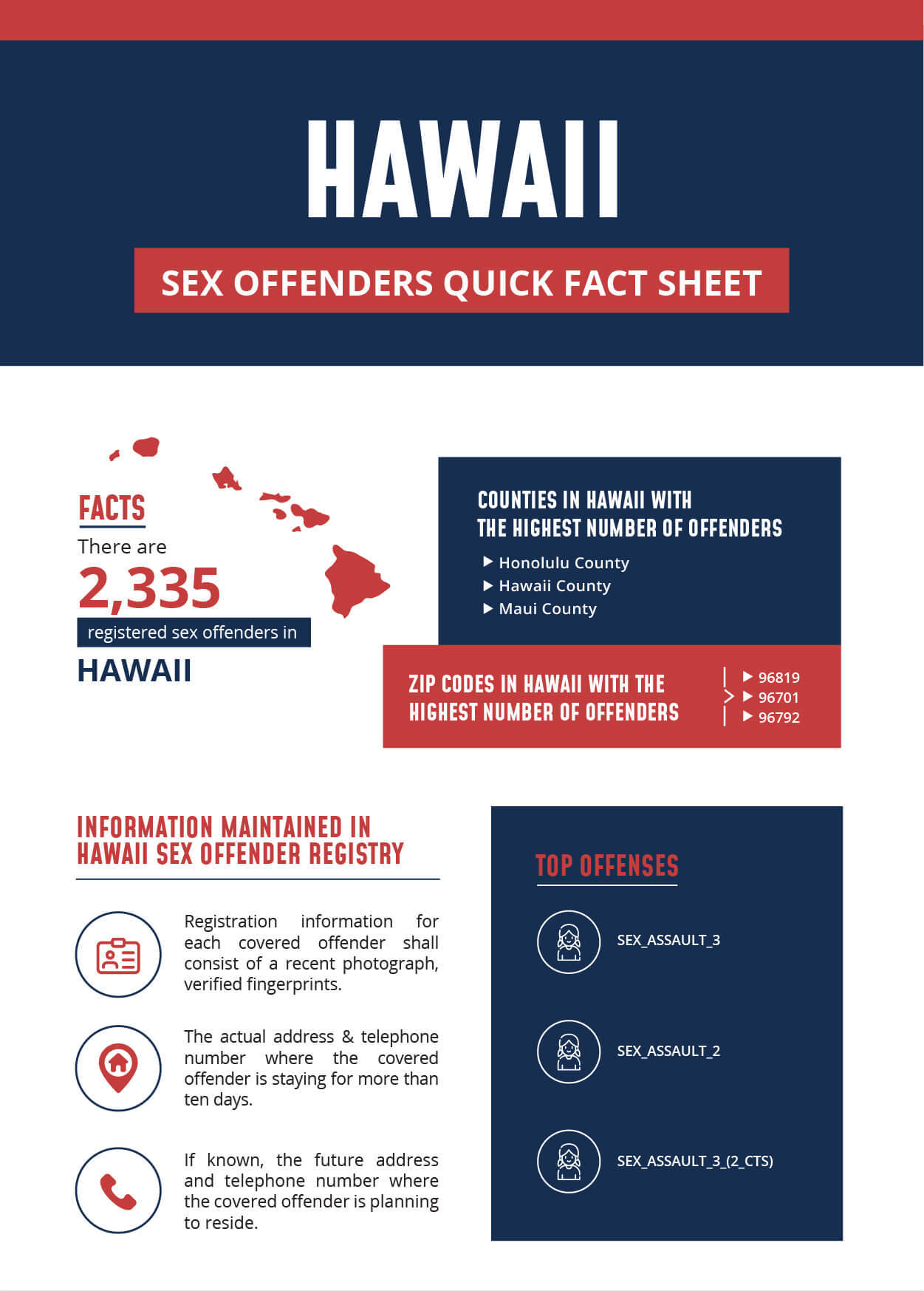Hawaii Sex Offenders Law protects the citizens of the state from sex offenders living in Hawaii. The Law subjects all sex offenders in Hawaii to mandatory registration. Sex offenders register with the office of the Attorney General of the State.
The timeframe for registration depends on the nature of crime. Registration may last a few years or for a lifetime.
The law also mandates all sex offenders living in the state to update their registration. Hawaii sex offender’s law covers both sex offenders living in Hawaii and convicted in another state but with the intent of residing in Hawaii.
The state criminal’s department makes sure the public are aware of the dangers of sex offenders in their community.
Identify Nearby Sex Offenders in Hawaii ⮕
Hawaii Sex Offender Registry
Hawaii Sex Offender’s Registry is in charge of information on sex offenders living in the state. According to the state’s sex offender’s law, the registry ensures that the accurate details on sex offenders in Hawaii are available to the public.
Hawaii sex offender’s registry works with the state’s criminal department to register sex offenders in Hawaii. The Registry also verifies the information by sex offenders to make sure they are accurate.
The Registry stores this information and makes them to the public available through the internet.
How Well do You Know the People in Your Child's Life?
Get a Background Report in minutes.
Hawaii Sex Offender Infographic

Learn and share vital facts and figures about Hawaii sex offenders with this convenient infographic.
View Hawaii Sexual Predator Infographic
Hawaii Sex Offender Facts
Facts
- There are 3,054 registered sex offenders in Hawaii as of 12/1/2021.
Top Offenses
- SEX_ASSAULT_3
- SEX_ASSAULT_2
- SEX_ASSAULT_3_(2_CTS)
- SEX_ASSAULT_1
- KIDNAPPING
Counties in Hawaii with the highest number of offenders:
- Honolulu County
- Hawaii County
- Maui County
- Kauai County
Zip Codes in Hawaii with the highest number of offenders:
Nearby States:
Hawaii Sex Crimes Requiring Offender Registration
- The kidnapping of a minor, except by a parent - HAW. REV. STAT. ANN. § 707-720.
- Unlawful imprisonment (1st degree) of a minor, except by a parent - HAW. REV. STAT. ANN. § 707-721
- .
- The attempt, criminal solicitation, or criminal conspiracy to commit the crimes above.
- A criminal offense that is comparable to or which exceeds one of the offenses above, or any federal, military, or out-of-state conviction for an offense that, under the laws of this state would be a crime listed above.
- Sexual assault (1st degree) - HAW. REV. STAT. ANN. § 707-730 (1)(a), (1)(b), (1)(c), but excludes conduct that is criminal only because of the age of the victim, as provided in HAW. REV. STAT.
- ANN. § 707-730(1)(b) if the perpetrator is under the age of 18.
- Sexual assault (2nd degree) - HAW. REV. STAT. ANN. § 707-731(1)(a)-(c).
- Sexual assault (3rd degree) - HAW. REV. STAT. ANN. § 707-732 (1)(b)-(f), but excludes Conduct that is criminal only because of the age of the victim, as provided in HAW. REV. STAT. ANN. §707-733(1)(b) if the perpetrator is under the age of 18.
- Sexual assault (4th degree) - HAW. REV. STAT. ANN. § 707-733(1)(a).
- Continuous sexual assault of a minor under the age of fourteen years (CONTINGENTLY REPEALED upon enactment of a constitutional amendment to define what behavior constitutes a continuing course of conduct) - HAW. REV. STAT. ANN. § 707-733.5.
- Promoting prostitution in the first degree - HAW. REV. STAT. ANN. § 712-1202.
- Kidnapping, as defined in HAW. REV. STAT. ANN. § 707-720, if the charging document for the offense for which there has been a conviction alleged intent to subject the sexual offense.
- Criminal sexual conduct toward a minor.
- Solicitation of a minor who is less than 14 years old to engage in sexual conduct.
- Use of a minor in sexual performance.
- Production, distribution, or possession of child pornography chargeable as a felony under HRS §§ 707-750, 707-751, 707-752 (promoting child abuse in 1st, 2nd and 3rd degrees).
- Indecent electronic display to a child HAW. REV. STAT ANN. § 707-
- Electronic enticement of a child (1st and 2nd degrees), if the act involves 1) sexual conduct, 2) attempted sexual conduct, or 3) a proposal to engage in sexual conduct - HAW. REV. STAT. ANN. §§ 707-756, 707- 757.
- Solicitation of a minor to practice prostitution.
- A criminal offense that is comparable to or which exceeds one of the offenses above, or any federal, military, or out-of-state conviction for an offense that, under the laws of this state would be a crime listed above.
Information maintained in Hawaii Sex Offender Registry
Information Maintained in Hawaii Sex Offender Registry
H.R.S. § 846E-2
(c) Registration information for each covered offender shall consist of a recent photograph, verified fingerprints, and a signed statement by the covered offender containing:
(1) The name, all prior names, and all aliases used by the covered offender or under which the covered offender has been known and other identifying information, including date of birth, social security number, sex, race, height, weight, and hair and eye color;
(2) The actual address and telephone number of the covered offender's residence or mailing address, or any current, temporary address where the covered offender resides, and for each address how long the covered offender has resided there;
(3) The actual address and telephone number where the covered offender is staying for more than ten days, if other than the stated residence;
(4) If known, the future address and telephone number where the covered offender is planning to reside, if other than the stated residence;
(5) Names and, if known, actual business addresses of current and known future employers and the starting and ending dates of any such employment;
(6) Names and actual addresses of current and known future educational institutions with which the covered offender is affiliated in any way, whether or not compensated, including but not limited to affiliation as a faculty member, an employee, or a student, and the starting and ending dates of any such affiliation
(7) The year, make, model, color, and license number of all vehicles currently owned or operated by the
Covered offender;
(8) A statement listing all covered offenses for which the covered offender has been convicted or found unfit to proceed or acquitted under chapter 704;
(9) A statement indicating whether the covered offender has received or is currently receiving treatment ordered by a court of competent jurisdiction or by the Hawaii paroling authority;
(10) A statement indicating whether the covered offender is a United States citizen; and
(11) Any additional identifying information about the covered offender.
Community Notification and Websites
H.R.S. § 846E-3
(a) Registration information shall be disclosed as follows:
(1) The information shall be disclosed to law enforcement agencies for law enforcement purposes;
(2) The information shall be disclosed to government agencies conducting confidential background checks;
(3) The attorney general and any county police department shall release public information.
(d) The following methods shall accomplish public access authorized by this section:
(1) Public access to the public information for each covered offender subject to subsection (c), paragraphs (1) through (4) shall be provided by both public Internet access and on-site public access or;
(2) On-site public access shall provide public access to the public information for each covered offender subject to subsection (c), paragraph (5); provided that on-site public access shall be provided for each covered offender at the Hawaii criminal justice data center and at one or more designated police stations in each county, to be designated by the attorney general, between the hours of 8:00 a.m. and 4:30 p.m. on weekdays, excluding holidays.
Limitations on Residency or Employment
None
Duration of Registration
H.R.S. § 846E-2
(a) Sex offenders must register for life.
H.R.S. § 846E-10
A sex offender who has substantially complied with registration and who is not an aggravated sex offender, repeat sex offender or sexually violent predator may petition the court for termination of his/her registration requirements:
- After 25 years if the most serious registration offense was a class A felony or non-Hawaii equivalent
- After 15 years if the most serious registration offense was a class B felony or non-Hawaii equivalent
- After 10 years if the most serious offense was a class C felony or its non-Hawaii equivalent, or a misdemeanor.
However, section 846E-10, HRS, provides provisions for termination of registration requirements.
Timeframe for Registration
Within 3 working days after arrival in the county where offender plans to reside longer than 1 month; within 3 working days of a change of address
Applies to Offenders Convicted in another State?
Yes
Verification of Address
Yes
Penalties for Non-Compliance
Class C felony
Free Parental eBook
Kids Live Safe put together a comprehensive parents guide about sexual predators and keeping children safe.
This free online eBook includes vital statistics, how to tell if a predator is victimizing a child, and social media and cyber-bullying.
See Kids Live Safe eBook 
View Registered Sex Offenders in Your Hawaii ZIP Code Below
- 96819
- 96701
- 96792
- 96720
- 96706
- 96797
- 96817
- 96815
- 96744
- 96793
- 96778
- 96826
- 96782
- 96822
- 96786
- 96707
- 96740
- 96813
- 96749
- 96732
- 96816
- 96818
- 96753
- 96789
- 96766
- 96734
- 96746
- 96814
- 96761
- 96771
- 96795
- 96704
- 96825
- 96708
- 96743
- 96791
- 96768
- 96756
- 96712
- 96748
- 96760
- 96821
- 96727
- 96750
- 96713
- 96717
- 96790
- 96754
- 96741
- 96725
- 96738
- 96762
- 96730
- 96781
- 96772
- 96731
- 96779
- 96783
- 96857
- 96722
- 96863
- 96853
- 96854
- 96860
- 96858
- 96859
- 96861
- 96850
